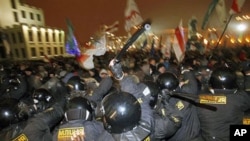The United States and European Union say they will review their relations with Belarus following the Minsk government's crackdown on opposition members after a disputed presidential election. U.S. and European officials reject the legitimacy of the vote-count last Sunday that gave longtime President Alexander Lukashenko an overwhelming win.
The strongly-worded joint statement by Secretary of State Hillary Clinton and European Union chief diplomat Catherine Ashton reflects the degree of dismay and disappointment over what had been seen as an opportunity for Belarus to shed its authoritarian image.
Official returns from the nominally-contested December 19 vote gave Mr. Lukashenko, a former Soviet official and the country's ruler since 1994, nearly 80 per cent of the vote.
Security forces arrested more than 600 people after a massive rally gathered in central Minsk election night to protest an outcome widely seen by Western observers as fraudulent.
In their joint statement, Clinton and Ashton called for the immediate release of the protesters, including at least seven opposition presidential candidates, and strongly condemned what they termed the "disproportionate" use of force against demonstrators.
They said that taken together, the election and its aftermath represent an "unfortunate step backwards" in the development of democratic governance and respect for human rights in Belarus, and that the people of the country "deserve better."
Clinton and Ashton said they will take the Lukashenko government's efforts to address the current situation into account as relations with Belarus are reviewed.
There was no indication of what the outcome of the review might be. But State Department Spokesman P.J. Crowley said this week U.S. sanctions against Belarus, in place since a disputed 2004 referendum that allowed Mr. Lukashenko a third term in office, will remain.
"Belarus and - President Lukashenko may well be a country that never misses an opportunity to miss an opportunity. Our sanctions will continue in place, and it's tragic what Belarus - what has happened in Belarus," said Crowley. "Respect for the democratic process and human rights of its citizens is at the center of our relationship and our aspirations for Belarus."
Hopes for change in Belarus had risen in recent years amid conciliatory gestures by the Lukashenko government including its release in 2008 of what were then considered the country's last political prisoners.
Early this month, on the sidelines of the Organization for Security and Cooperation in Europe summit in Kazakhstan, Clinton and Belarusian Foreign Minister Sergei Martynov announced an agreement under which Belarus will give up a stockpile of Soviet-era highly enriched uranium.
Spokesman Crowley on Tuesday expressed hope the election controversy will not derail the nuclear agreement, which he said is important for the world community and other states in the region.
Clinton and High Representative Ashton said the United States and EU intend to continue engagement with the Belarusian people and civil society representatives.
They urged Belarus to meet commitments to the OSCE and reform the electoral process, and to "create political space" for activists, civil society and independent journalists.
US, EU to Review Belarus Relations After Minsk Crackdown




